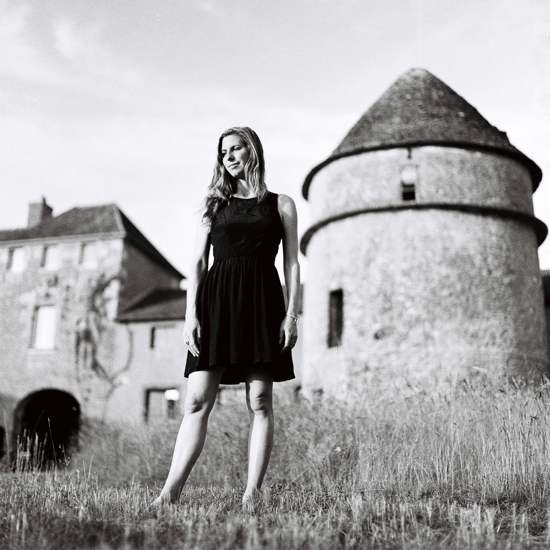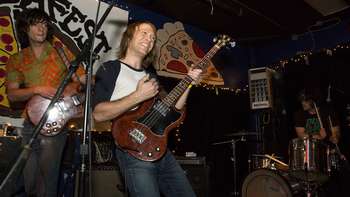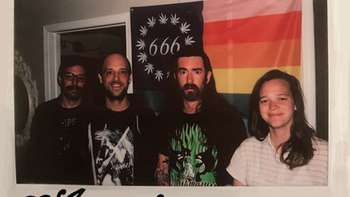Rebecca Foon is a prominent member of the Montreal experimental music scene. Having participated in acts like Set Fires to Flames, Thee Silver Mt. Zion and Esmerine, she embarked on her own with her project Saltland, releasing its first album, I Thought it Was Us But It Was All of Us in 2013. Having put out a follow-up, A Common Truth, Scene Point Blank caught up with Foon to discuss how she got involved in music, moving from Vancouver to Montreal, getting it touch with other musicians in the scene and composing her own music and lyrics. An avid activist for a climate safe world, having co-organized the Pathway to Paris events, we discuss the current situation, the importance of the issue and some future plans regarding the events.
Scene Point Blank: Can we start with your background? You are a classically trained cellist. Did you start at an early age?
Rebecca Foon: Yeah, I did. Not that early, I started when I was eight, which at the time was very old, 'cause in the classical world people start when they are three or four.
I do not come from a musical family, so I did not really know much about music or musical instruments, but I was lucky because I went to an elementary school that had a strings program, and that is how I discovered the cello. I saw the kids playing the violas, violins, cellos, bass and I fell in love with the cello somehow…and then I asked if I could join that program and play that instrument….
Scene Point Blank: What was it about the cello that you liked more than the violin or viola?
Rebecca Foon: I think it was the sound, and I think I just found the shape of it really beautiful. It is very connected to the human voice because it is [in] the same range as the human voice, so I think I was very moved by the range and the aesthetics of it. And that is why I really believe in music education, because it gives kids a chance, from different families and income levels to tap into music that they might not necessarily have the opportunity to otherwise.
Scene Point Blank: Do you believe that the educational system in Canada helped you?
Rebecca Foon: Definitely, 'cause I never would have gone into music if I did not have it in my public school. So I really believe in public school and offering programs, and the diversity of our programs for kids that would not have the opportunity otherwise to dig their toes into [music].
Scene Point Blank: When you were 17 you moved from Vancouver to Montreal?
Rebecca Foon: I went to McGill, and I did some music [at the university]. It was an opportunity for me to move to Montreal. But I left Vancouver for Montreal, kind of out of intuition. I never been there but I heard there was a strong cultural/music/art scene in Montreal, much more vibrant than in Vancouver and I was intrigued by the culture. The francophone and anglophone cultures and it interested me and intrigued me. My intuition was telling me I would have more opportunity there.
I was playing in a band in high school, and there was a little of opportunity there but I did not know that many musicians. I did not know any musicians my age, everyone I was playing with was like ten years older than me. [Laughs]. I was shy and I would lie about my age, because I did not want them to feel weird I was still in high school.

Scene Point Blank: Do you still follow the scene at Vancouver at all?
Rebecca Foon: Yeah. It is interesting because, since then, I have met a lot of musicians that were from Vancouver, and there seems like there is a bunch of musicians but at that time it did not feel that culturally rich of a city. I did not feel there was that much opportunity for me as a musician. But definitely, there is a vibrant scene there now.
Scene Point Blank: Well, you were definitely right about the Montreal scene.
Rebecca Foon: Yeah, God who knew?
Basically, how I started was playing in the dance world. There was a strong dance program, so I tapped into a lot of the dancers and that program needed live music and compositions. I started composing and performing live with them, and that introduced into the world of composing as a solo musician and sometimes with other musicians, and improvisation.
That was really important for me because coming from the classical world my brain was shaped in a specific way. And as a cellist, I had guilt in not moving forward in the classical world, and that I maybe was not a real musician, and it took me many years to get over that [Laughs]. But then, I was also really inspired by pushing the language of the cello, because even though in violin there was much more of a world already developed outside of classical music, that was not the case with the cello. I could not find much inspiration outside of the classical world in cellists out there. There is the Yo-Yo Ma venture and other music, but it is still quite technical and classical, it is more like written music than performed. So, it gave me a chance to break some moulds that I had grown up with and that was really exciting for me.
Scene Point Blank: How did you get get in touch with other musicians from the Montreal scene?
Rebecca Foon: I joined a band and I started playing at the Hotel2Tango [legendary recording studio in Montreal] and that is where I met Efrim [Menuck, of Godspeed You! Black Emperor]. He said he was starting another project called Thee Silver Mt. Zion and we kept in touch, even though I moved to South Africa for a year, and he asked me to join the project. And then also, I had met people from Set Fire To Flames, and Dave [Bryant] also asked me to join the band, and that is how I met Bruce [Cawdron], who was the drummer for GY!BE, and together we started Esmerine. And Esmerine is still active today, we had a couple years off, but this project has been going since 2001.
Scene Point Blank: I believe that Esmerine is the only one of these projects you are still involved in?
Rebecca Foon: Yeah, and the only one that is still active really.








